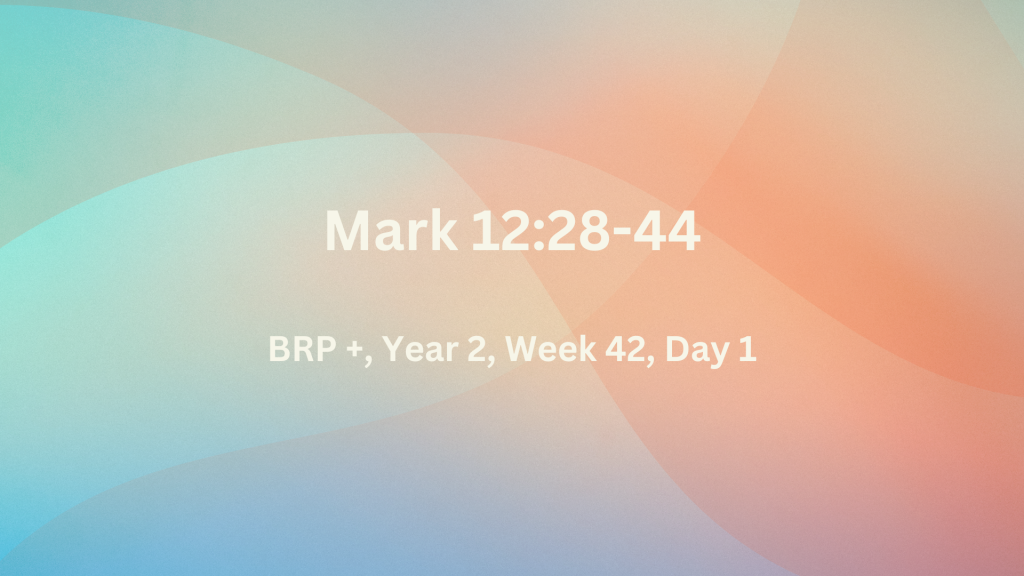Mark 12:28-44
Q.1. What did the Scribe ask Jesus? How did Jesus respond to him? Did the Scribe agree? How did Jesus view this man? – (Mk.12:28-34)
The Gospel writers all agreed that the attack on Jesus was a combined effort by the Scribes, Pharisees, Sadducees and Herodians (see Mt.23:15, 23, 34; Mk.12:12-13). However, Mark recorded that this one Scribe acknowledged that – … Jesus had answered them well … (Mk.12:28). Furthermore, Mark wrote – When Jesus saw that he had answered intelligently, He said to him, “You are not far from the kingdom of God” … (Mk.12:34). The Scribe had asked Jesus the leading question of Judaism – What commandment is the foremost of all (Mk.12:28). Jesus answered him correctly by quoting the SHEMA (meaning Hear) from Deuteronomy 6:4-5. Pious Jews recited the SHEMA every morning and evening. The command to love God with our all hearts was taken from this passage from Deuteronomy. The Gospel records reveal that Jesus indeed lived by every word that proceeds from the mouth of God (see Dt.10:12; 30:6). Jesus added the second greatest requirement, which is that we love others. This was taken from Leviticus. These two commandments underpin the rest of the Law (see Lev.19:18). The Scribe understood that the moral law took precedence over the ceremonial law and conceded that loving God and your neighbour – … is much more than all burnt offerings and sacrifices (Mk.12:33). Like all other devout Jews, the Scribe would have believed that he was one of the elites in God’s eyes. Jesus’ reply gave him no such assurance that he was part of the kingdom of God (see Mk.12:34 quotes above).
Q.2. What probing question did Jesus ask? To what did He draw their attention? What point was He making? How did He view the scribes? – (Mk.12:35-40)
After the sustained attack from the religious leaders of Judaism, Jesus drew attention to their unbelief – as He taught in the temple, “How is it that the scribes say that the Christ is the son of David? 36 David himself said in the Holy Spirit, ‘The Lord said to my Lord, “Sit at My right hand, Until I put Your enemies beneath Your feet.”’ 37 David himself calls Him ‘Lord’; so, in what sense is he, His son?” (Mk.12:35-37). This interpretation by Jesus was incredibly insightful because it confirmed that the Holy Spirit caused the prophets to write prophecy (see 2 Pet.1:20-21). Jesus was implying that He was not just the promised Son of David but also the Lord of Glory. Not surprisingly, that was how He was presented by the apostle Peter on the day of Pentecost (see Acts 2:25-36). Jesus went on to condemn the false teaching of the Scribes who were primarily responsible for misrepresenting the truth and misleading the people (see Mk.12:38-40).
Q.3. What was Jesus doing at the treasury? Why did He draw attention to the widow? How did people give? How did she give? – (Mk.12:41-44)
Jesus was at the treasury where He could illustrate which motivation behind our giving pleases God. He – sat down opposite the treasury and began observing how the people were putting money into the treasury; and many rich people were putting in large sums (Mk.12:41). Some people may be embarrassed by their relatively small gifts and others may be filled with pride because of their larger gifts. God doesn’t evaluate our giving on that basis. The person who impressed Jesus that day was – a poor widow who came and put in two small copper coins … (Mk/12:42). Jesus called His disciples and stated that this widow had given more than all the other contributors by comparison (see Mk.12:43). How could that be? Jesus explained – they all put in out of their surplus (abundance), but she, out of her poverty, put in all she owned, all she had to live on (Mk.12:44). Widows were often despised, but Jesus greatly honoured this woman.

